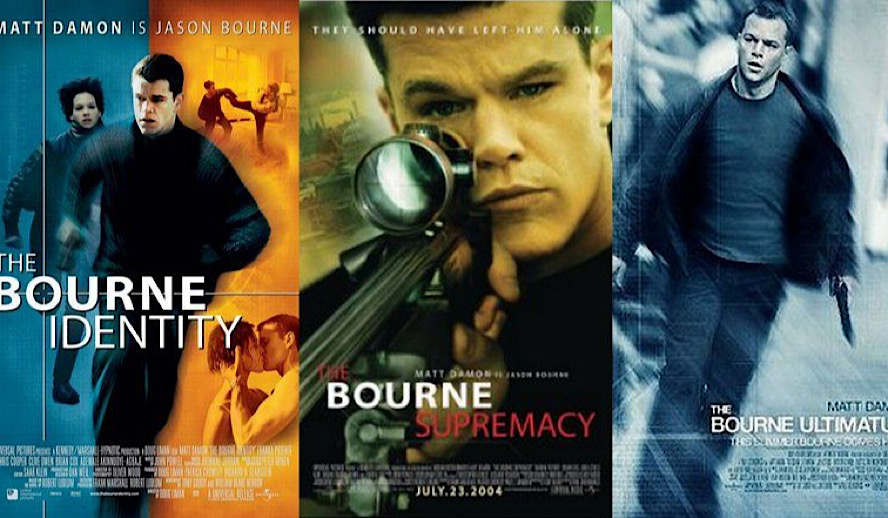Table of Contents

Photo: The Bourne Trilogy/Universal Pictures
The Case For Bourne
The combination of the original three Bourne films constitutes one of the best trilogies you will find. Each film is entertaining and dramatically engaging, often in equal measure. Though similar narratively, they all benefit from occupying a slightly different sub-genre within the spy genre. The Bourne Identity is surprisingly effective as a straight drama. The Bourne Supremacy is a taught thriller and The Bourne Ultimatum is a great full-throttle action film. Matt Damon’s contentious casting as Jason Bourne has clearly proven to be genius. His fresh-faced sense of youth is key to his likability in Identity and throughout the films, you increasingly come to care for him. Damon also grows in toughness to become thoroughly believable as an action hero.
Related article: The Rise of Matt Damon: A Tribute to the Highly-Deserving Hollywood Star
Related article: James Bond Books and Movies: The Evolution of our Favourite Spy Since Ian Fleming
Bourne was influential in fuelling the fast-paced, realistic action that so many similar movies adopted since its release- James Bond is the most notable example (Casino Royale’s opening bathroom fight scene has got Bourne’s fingerprints all over it). In fact, for those seeking an antidote to Bond, Bourne is incredibly fitting, especially since at the time of release Pierce Brosnan was still getting chased atop CGI waves. Unlike Bond, Bourne is concerned with questioning the ethics of the spy lifestyle and the bureaucracies controlling it rather than simply glamorising it – the sense of an inner moral battle within the CIA is a continuously interesting feature. Unlike Bond, the assassins fighting Bourne are human beings and are always suggested as questioning the lifestyle they have adopted in the same way that Bourne is forced to do.
I use Bond as a point of comparison because the way they interlink is interesting. Bourne obviously has a similar template to Bond but uses it to tell a more humane story, which seems to have fed back into the more recent Bond films, which themselves have been retroactively inspired by Bourne’s more earnest and gritty tone. Though Bourne is often thought of as being more serious, it still boasts that witty dialogue you want from spy films and is more playful than it is given credit for. It even has a great soundtrack, held together to the tune of Moby’s ‘Extreme Ways’. Join me as I revisit each film in the trilogy, from The Bourne Identity to The Bourne Ultimatum.
Subscribe to Hollywood Insider’s YouTube Channel, by clicking here.
Identity: The One That Makes You Care
The franchise kicks off with The Bourne Identity, a film that boasts an immediately exciting premise for the rest of the trilogy: ex CIA agent Jason Bourne is found at sea with two bullets in his back. He doesn’t remember anything about who he is, yet he quickly discovers that he not only has special abilities but that the CIA is chasing him.
Matt Damon is an unlikely choice as Jason Bourne but he is exceptional from the get-go. Though fresh-faced, he is convincing as the badass action hero and he is also likable, which is hugely important to the success of the overarching story.
The pen-pushers trying to kill Jason Bourne are intriguing, in that they are clearly acting out of fear for their careers rather than pure evil. Their wrongdoing is also of interest in that their ruthlessness represents the film’s clear critique of the implicit inhumanity of such organisations. This is an intriguingly modern take on spy culture when pitted against the constant glamorisation of Bond, where callousness is cool. The assassins sent to fight Bourne are also most intriguing in Identity– the recurring theme of implicit camaraderie between Bourne and his enemies is best presented here, not least through the pivotal and poignant interaction between himself and Clive Owen’s The Professor. Though cold, none of the franchise’s antagonists are pantomime villains. Chris Cooper is also excellent as Identity’s central foil.
Related article: The Power of Positivity: Ikorodu Bois + Chris Hemsworth + Russo Brothers + Sam Hargrave
Limited Time Offer – FREE Subscription to Hollywood Insider
The Bourne films are known for a sense of realism, and the beginnings of this are evident in Identity. Though it doesn’t possess the documenting style of later entries, it is still more grounded than the average spy film of its time. While James Bond was engaging in Arctic Aston Martin chases, Bourne was escaping police in a more beaten down ride (a good precedent for the series’ approach to the car chase trope). Identity’s sense of physicality is most apparent in the genuinely intense showdown in Bourne’s apartment in Paris. This is the first proper fight scene and it really hits home. This grit isn’t just for stylistic effect – Bourne’s grounded style is innovative because it makes it easier to relate and care about the central character despite the inherent ludicrousness of his predicament.
Another string in Identity’s bow is the strength of its central romance. Marie (Franka Potente) is a well-written character: like Bourne she is a drifter, unsure of her past and future. Their coupling seems natural and beneficial in other ways beyond the obvious attraction. As a love story, the film is entirely successful; the romance is moving and believable. The kissing scene is one of the best I have seen – the implicit detail that Bourne needs to be re-taught how to kiss is subtle and perfectly performed. Once again, this is an example of the film and the franchise’s tendency to go beyond what is expected of the spy genre. The love interest is reframed, like many of the film’s elements, to suit the realistic tone.
Related article: Hollywood Insider’s CEO Pritan Ambroase: “The Importance of Venice Film Festival as the Protector of Cinema”
Related article: The Masters of Cinema Archives: Hollywood Insider Pays Tribute to ‘La Vie En Rose’, Exclusive Interview with Director Olivier Dahan
The same could be said of the constant globe-trotting, which increases throughout the series. It is a trope of the genre that the hero’s journey must span several different countries. The difference here is that Bourne travels because he is constantly on the run rather than out of the film’s need to present a glamorous location (Hello again, Bond). From the beginning of The Bourne Identity to the end of The Bourne Ultimatum, Bourne never stops traversing the globe. There is a randomness to his adventures which adds to the sense of frenzy and threat. You really feel like he is in danger constantly, and he is.
The Bourne Identity also gave birth to essential features the franchise continued in subsequent instalments. It began the bursts of witty, concise dialogue that would become a mainstay. There are some excellent character-boosting exchanges, such as when Bourne movingly tells Marie that “You are the only person I know”, the truth of which hits home.
The super-cool soundtracks the other two films boast can also be traced back to Identity. It does however falter where the sequels don’t. It is more dated. Though it is still more realistic than its peers, on some occasions the fight scenes slip into silliness- visually and sonically they are occasionally overblown and Bourne seems like a superhero sometimes. The climax sees him fall from the top of a staircase in a moment that strangely evokes a similar moment in Batman Begins. Though the soundtrack is brilliant, it is clear that it is from the ‘90s and some of its drum and bass influences haven’t aged well. But other than that, The Bourne Identity is crucial viewing- it is the instalment that makes you care.
A Supreme Sequel
The Bourne Supremacy introduced director Paul Greengrass (Captain Phillips), who took over from Identity director Doug Liman. In it Bourne is set on a path of revenge after Marie is cruelly assassinated. This search leads Bourne to some unpleasant revelations about his past.
The introduction of Paul Greengrass brings about the series’ discovery of its stylistic identity (no pun intended). Greengrass’ favours documentary-style camerawork and fast-paced editing, which was perfect for the Bourne universe. Supremacy’s central innovation is that it accentuates the sense of realism present in the first film to provide a more distinctive sensory experience. None of Identity’s more dated elements carry over: Supremacy feels grounded almost all the time. Even the soundtrack is more streamlined.
Related article: Remembering Sean Connery: A Tribute to a Legend Who Launched the James Bond Franchise
Related article: Sean Connery James Bond Movies, Ranked
This visceral quality allows Supremacy to flourish more like an action thriller. If Identity set up the characters well, Supremacy succeeds as a movement-led piece. There is very little dialogue and a lot of visual stories. Where The Bourne Identity was grounded, Supremacy is naturalistic. The action scenes are unafraid to be action scenes, and their omission of dialogue benefits the general sense of believability. When people say that Bourne influenced modern-Bond (and they do), this is this film that fuelled this- the fast-paced style seems to have defined action movies of the modern era. That being said, the heavier focus on action doesn’t sacrifice the story themes present in Identity, instead, it adapts them to this style. When Bourne has the opportunity to kill Kirill he doesn’t- and you can practically feel Clive Owen’s monologue from the previous film as this plays out despite the lack of words. Though more action-led Supremacy certainly retains the themes of Identity.
Bourne is more threatening in this film. This is partly because Matt Damon seems more imposing. It also owes to the story- Bourne is hell-bent on revenge and intent on bringing a fight “without measure” to the CIA, as he promised in Identity. However, the fear factor associated with him owes even more to Greengrass’ direction. His more physical approach allows you to be immersed in the experience of being Bourne- the camera is so close to him that you feel integrated into his subjective viewpoint. Instead of being told about his power, you spend the film watching it and feeling it- this is incredibly effective. Bourne’s brilliance is more plausible in Supremacy because you spend so much time seeing him actually do the things that enable him to evade his enemies without words or obvious imagery (a recurring feature of the franchise is that Bourne is as intelligent as he is strong). Each action scene sees him succeed in increasingly creative ways, and Greengrass’ no-nonsense visual style helps propel this. Ultimately this increased physicality further makes Jason Bourne believable and engaging.
The Bourne Supremacy also progresses the inherent mystery of Identity well, and much of it still plays out like a thriller despite the more aggressive style. The central mystery of the film reveals more about the violence of Bourne’s past. It leads to some poignant moments, not least in what is probably the franchise’s most moving final scene. At their best the Bourne films are more than just a collection of exciting flicks- in each instalment Bourne must reckon with his horrific past and attempt to repent. This is where the story’s heart comes from, and Supremacy continues this nicely.
Related article: Watch: Behind The Scenes Of ‘Ford V Ferrari’ And Reactions From Christian Bale, Matt Damon, James Mangold & Team
Related article: Video: ‘Ford V Ferrari’- Reactions From Stars on Golden Globes Nominated and Oscar Worthy Film with Christian Bale, Matt Damon, James Mangold & Team
Part of the mystery is also the extent of the CIA’s villainy, and this is equally gripping in the film. The excellent Brian Cox reprises his role as the villainous Ward Abbott, whose evil is, as it is in Identity, rooted in human selfishness and bureaucratic cowardice. He is a suitably muted villain for the modern age and he allows for the franchise’s critique of robotic pen-pushing evil to continue engagingly.
Supremacy also continues the series’ occasional wit. The oh-my-god-he-can-see-us situations are very entertaining and bring a cheekiness which allows for the film to have some silly fun whilst it tells its story. Supremacy’s final line “Get some sleep Pam, you look tired” is killer. This underlying sense of humour shouldn’t be underestimated as a minor detail- it is present in all three Bourne films and appears even more in Ultimatum.
Though The Bourne Supremacy introduces much vitality into the series and improves upon Identity in many ways; it could equally be said that it doesn’t possess the first film’s heart. It is undoubtedly less of a character-led experience- it pelts off at breakneck speed with very little hand-holding. Though it isn’t overtly heartfelt, it trusts the emotional impact to come from what has already happened in Identity and the natural intensity of Bourne’s situation. This does work although it is less frequently poignant than Identity. This is partly because Identity’s original premise can’t be beaten. Each time Bourne is re-sought after it feels slightly repetitive because it is. Still, Supremacy can only progress what is already there, and it does this with enough innovation to keep the overall story fresh and engaging. My only other criticism of Supremacy is that sometimes it feels a little too quick – the action scenes are occasionally too disorientating.
Related article: Finding the New James Bond? ‘No Time To Die’ Will Be Daniel Craig’s Final 007
Related article: Video – Introduction Compilation: All ‘Bond… James Bond’ 007 Intros 1962 to 2020, Sean Connery – Daniel Craig
The Ultimate Conclusion
The Bourne Ultimatum is that rare third film that combines the most interesting elements of a franchise to deliver the best entry yet. It takes place during and after The Bourne Supremacy as Jason Bourne discovers a final piece to the puzzle that is his past whilst the hunt for his head intensifies.
Like every entry, Ultimatum occupies a slightly different tone within the spy genre. If Supremacy was a fast-paced thriller and Identity was more character-led, Ultimatum is a white-knuckle action film. It builds on the realistic physical style of its predecessors and is even more frenetic and visceral. Its many fights are crisper than ever- here Greengrass masters the shaky-cam style. The chase-into-fistfight scene in Morocco is one of the best action set pieces I can remember, and the Waterloo scene is cleverly handled, displaying Bourne’s streetwise brilliance better than ever before. Like The Bourne Supremacy, there is a lack of dialogue that is even more prevalent here where it creates a sense of urgency- Bourne needs answers, and doesn’t have time to talk. The word thrill ride is overused, but it applies to The Bourne Ultimatum.
Every final film needs to provide its own story whilst paying off the overarching narrative, and Ultimatum does this. It firstly does so in spirit. Ultimatum has the heart and soul of Identity and the thrills of Supremacy. It is also efficient in closing previously established narrative loops- it is even set during the chronology of Supremacy. The critique of the inhumanity of assassins is as present here as it was in Identity– Bourne once again refuses to kill the assassin sent to kill him, and even echoes The Professor’s final words, “Look At What They Make You Give,” during the climax. The memory of Marie is briefly alluded to and is a nice addition. Even Nicki Parsons, who is in every film, is briefly alluded to as a former love interest in a way that deepens the world without being silly or cheap. Truth-seeking CIA agent Pam (Joan Allen) is as good as she was in Supremacy, and is integral to the conclusion- her arc coincides nicely with Bourne’s. The result of all this tying up of loose ends is that you realise how much you care for the world and for Bourne. At this point, Matt Damon also totally seems like he is Jason Bourne- gone is the scrawny boy from Good Will Hunting.
Related article: ‘Dune’: Reactions from Timothée Chalamet, Denis Villeneuve, Zendaya, Jason Momoa & Co-Stars
Related article: Everything We Know About the Upcoming Live-Action ‘Avatar: The Last Airbender’
Ultimatum isn’t perfect- the assassins sent to fight Bourne are increasingly less interesting. David Strathairn’s villain is essentially just a more ruthless version of the antagonists before him (although this endless supply of evil suits is part of the story’s point). Also, those who haven’t seen the previous two films may be alienated by Ultimatum’s frenetic pace and lack of overt explanation. But for the initiated, this is as good as trilogy conclusions get.
Where Bourne Series Ultimately Stands
Though not quite on the level of such trilogies as The Lord Of The Rings, The Dark Knight Trilogy, and the original Star Wars films, the Bourne films are certainly not that far behind, especially in terms of their consistency. Bourne is essential viewing for those interested in the spy genre. Identity provides great drama, Supremacy is an equally exciting thriller and Ultimatum combines the best of both worlds to provide an extremely satisfying conclusion. Its style was crucial in changing action movies such as James Bond and yet it still knew that first and foremost, it needed to be substantive, and it was. If you disregard The Bourne Legacy and Jason Bourne (and disregard them you should), this is a franchise that can and should rest in peace with the knowledge that it will remain one of the genre’s very best, for a very long time.
Click here to read Hollywood Insider’s CEO Pritan Ambroase’s love letter to Black Lives Matter, in which he tackles more than just police reform, press freedom and more – click here.
An excerpt from the love letter: Hollywood Insider’s CEO/editor-in-chief Pritan Ambroase affirms, “Hollywood Insider fully supports the much-needed Black Lives Matter movement. We are actively, physically and digitally a part of this global movement. We will continue reporting on this major issue of police brutality and legal murders of Black people to hold the system accountable. We will continue reporting on this major issue with kindness and respect to all Black people, as each and every one of them are seen and heard. Just a reminder, that the Black Lives Matter movement is about more than just police brutality and extends into banking, housing, education, medical, infrastructure, etc. We have the space and time for all your stories. We believe in peaceful/non-violent protests and I would like to request the rest of media to focus on 95% of the protests that are peaceful and working effectively with positive changes happening daily. Media has a responsibility to better the world and Hollywood Insider will continue to do so.”
Ways to support Black Lives Matter Movement to end systemic racism
More Interesting Stories From Hollywood Insider
– Want GUARANTEED SUCCESS? Remove these ten words from your vocabulary| Transform your life INSTANTLY
– Compilation: All James Bond 007 Opening Sequences From 1962 Sean Connery to Daniel Craig
– Do you know the hidden messages in ‘Call Me By Your Name’? Find out behind the scenes facts in the full commentary and In-depth analysis of the cinematic masterpiece
– A Tribute To The Academy Awards: All Best Actor/Actress Speeches From The Beginning Of Oscars 1929-2019 | From Rami Malek, Leonardo DiCaprio To Denzel Washington, Halle Berry & Beyond | From Olivia Colman, Meryl Streep To Bette Davis & Beyond
– In the 32nd Year Of His Career, Keanu Reeves’ Face Continues To Reign After Launching Movies Earning Over $4.3 Billion In Total – “John Wick”, “Toy Story 4”, “Matrix”, And Many More
Bourne series, Bourne series, Bourne series, Bourne series, Bourne series, Bourne series, Bourne series, Bourne series, Bourne series, Bourne series, Bourne series, Bourne series, Bourne series, Bourne series, Bourne series, Bourne series, Bourne series, Bourne series, Bourne series, Bourne series, Bourne series, Bourne series, Bourne series, Bourne series, Bourne series, Bourne series, Bourne series, Bourne series, Bourne series, Bourne series, Bourne series, Bourne series, Bourne series, Bourne series, Bourne series, Bourne series, Bourne series, Bourne series, Bourne series, Bourne series, Bourne series, Bourne series

Amhara Chamberlayne is a graduate in English Literature from Warwick University who shares Hollywood Insider’s passion for cinema. When he is not watching films he is writing about them. Uninterested in gossip and agenda, Amhara instead believes in sharing his honest individual reaction to cinema. He enjoys the multi-variant reactions films elicit and believes his take is just as valid as others. For Amhara, the joy lies in the exchange of opinions.








